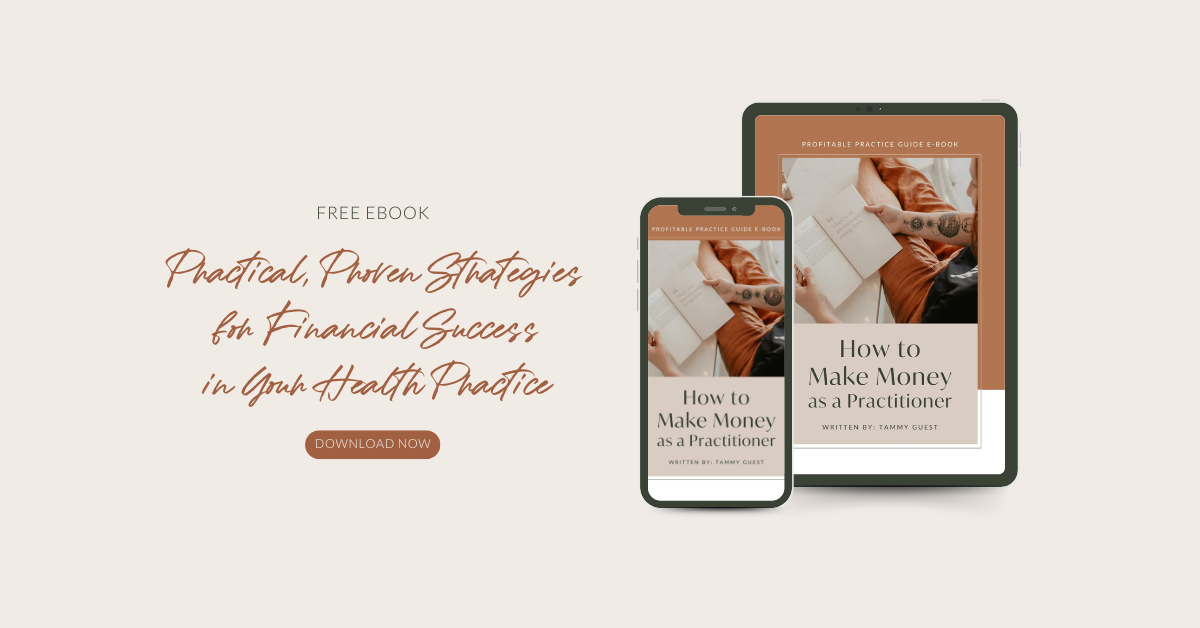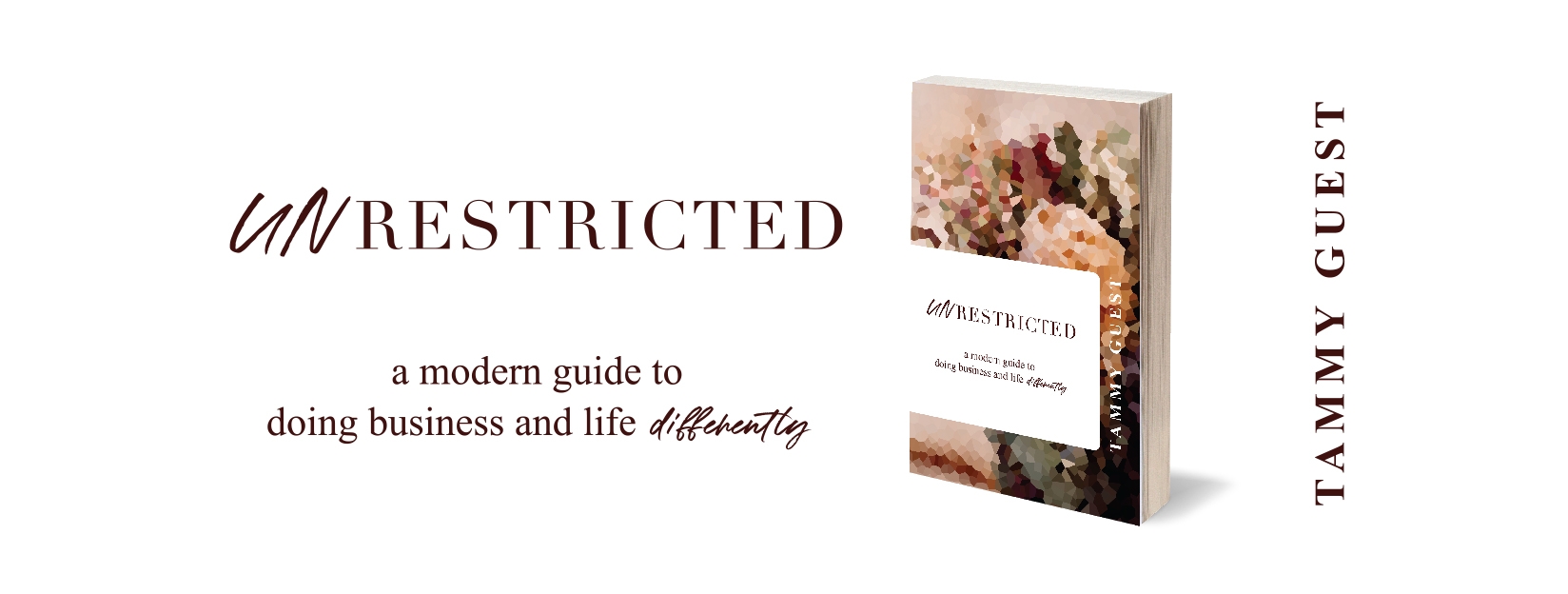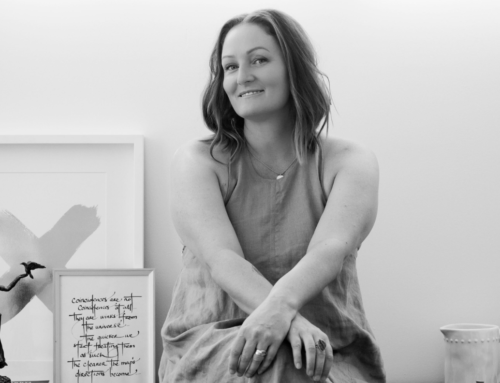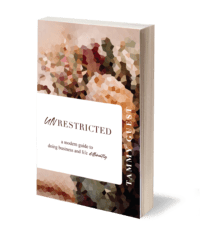I recently spoke with Brand Strategist Nikki Clark on how to stand out in a sea of health and wellness peeps, and why branding isn’t just a logo and some colours.
I crossed paths with Nikki several times over the past seven years or so, and now Nikki is back on the scene helping amazing entrepreneurs with their branding and marketing in an extraordinary way.
My life was really changed by Nikki about seven years ago, after one tiny little opt-in of hers that I signed up for (It’s a perfect example of how, as an entrepreneur, you never know where one little piece of your content is going to end up!).
I was really moved by that opt-in that I downloaded many years ago. It’s really formed part of the way that I explore what my brand is and what that looks like in so many different facets of my business. Our talk was really helpful, so I’ve put together a transcript of the conversation below or you can listen to the interview here. Enjoy x
T: Let’s dive in first with how you got into branding in the first place, Nikki.
N: My journey started back in the 90s, in 1991. My mum at the time owned four Benetton shops and in the 90s, that was just about as cool as it could get.
So she had these franchise stores and the Benetton advertising was really controversial for its time. They had these huge images of a black woman feeding a white baby, and nuns kissing, and coloured condoms. They had this huge vision around uniting the world that was called the ‘United Colors of Benetton.’
I found it really, really fascinating. It was my first experience of a brand that had a vision bigger than something that it sold. I obviously started to have a relationship with this so I’d cover my textbooks in all these different advertising images and have conversations at school.
I really fell in love with the idea that a brand wasn’t a logo and I realised a brand was a relationship.
What is a Brand?
T: I want to dive deeper into that later. It’s a really big deal and a really amazing differentiator. A lot of people, when they’re first starting out in business, think that a brand is a logo and colours but it’s so much more than that.
N: I think that’s because brand is intangible for a lot of people. There’s not one clear, recognised definition of what ‘brand’ is. To me, it’s an emotion, and a feeling, and everything that you stand for. It’s everything that people perceive and think about you. That’s your brand. It’s that meaning that people attach to you, it’s where they have stored you away and what compartment they put you in, in their mind, and what meaning they attach to that. That to me is your brand. And there are so many pieces that go into that.
So that was my first experience back then. I was super passionate about it so I went onto University and studied fashion marketing and branding. I got my first gig working for Levi’s in marketing. That was a really interesting time as well because their brand was actually in decline at that time. They had gone through this height of the 80s and 90s of being really cool and then they’d lost sight of their target audience. So they were in this bit of a decline and looking at how they could turn things around. So that was another interesting experience.
Then I went on for the next 15 years and worked for lots of different brands, both in-house and in agencies. Nike, Levi’s, IBM, Billabong, Red Bull – lots of different big brands. I immersed myself in the consumer psychology side of things of what makes people want to have a relationship with your brand.
Then I left my corporate job in, must be 2014? I keep losing track of when it is actually. My kids were fairly young at that time. Like a lot of people, I had my kids and thought that wasn’t going to change anything.
T: Yeah, just chuck them in the backpack, travel the world, and continue our corporate job!
Making the leap
N: Totally! I remember now having those conversations with people who had kids and them just kind of looking at me like, Yeah, you don’t know what’s coming.
So I went back to work and I found it really hard to have that balance. I found it hard to be a great mum and be great at my job at the same time. I pretty much felt like I was failing in every area for quite a while.
It was around the time that I stepped out and I met you. I did what a lot of people do. I looked at what I could do online and realised that I could share my knowledge, what I do, help people. and actually, make more of a difference. Because I’d be working with smaller businesses where you actually see the impact of the work you’ve done, rather than in a massive corporation where you’re so divorced from the end outcome.
So I stepped out and started my own business and I guess the rest is history. I have been doing that joyfully for quite a while now. It fits in very flexibly around my kids. I take on clients that I love working with and projects that I’m passionate about. I really love helping people build their brands and make an impact in the work that they do and get it out into the world.
T: I love that! So what did you find was the biggest distinction between working with massive corporations that have huge big boards and big decision makers and things like that in the Nike, Red Bull, Levi’s to, say, practitioners and solo business owners? What is the really big distinction there for you?
The difference between Big Brand and solo business owners
N: I think there are a few distinctions.
First of all, big organisations really get branding. They know that their brand is a saleable asset, they know that’s where their equity is. They spend a lot of time in the strategy and ideation phase and really understanding their customer. Because there’s a lot of money on the line. You don’t put something out into the world if you haven’t researched it.
I think in small business, we quite often skip that step. Sometimes people are going into business because it’s just a personal passion. They really want to do something. They set out and don’t think about the strategic foundations of their business.
But the second thing that I think is really important is – when you are a small business, you’re so invested in your clients or your customers and what you can do for them.
It’s actually much more exciting to work in that phase with a business owner. Because they can see the impact when they really identify who they want to connect with, how they talk to them, how they can serve them, and how their brand is experienced. Whereas in a big organisation, you work on something and then, six months down the line, a campaign might come out. You don’t really see the impact of the work that you’ve been doing.
Building a brand and a business is a long-term game
I would say there’s definitely a mindset difference. In the online world, there’s this proliferation of the message around how everything just happens overnight. How it’s a short game. But building a brand and a business is a long-term game. You start with a small seed and you grow and grow and grow. I think sometimes in small business we expect to be at the 10-year mark when we’re at the one-year mark.
That’s a hard mindset shift to get around.
T: That’s one of the big ones that I’ve been listening to on a quite a number of other podcasts recently. We do have this strange thing that happens in our brains that even though we’re listening to somebody or looking at their website and they have hundreds and hundreds of pieces of content on there. But we think they’re an overnight success because we happen to have just found them overnight.
From their perspective, they’ve been working at it for 10 to 15 years and all of a sudden, it’s just reached that tipping point where other people start to know them. They’ve created their opus of a book that’s come out. But that came from years and years of building their brand, continually having these conversations, and building their relationship and rapport with the people who were interested in engaging with their stuff. It’s a fascinating juxtaposition between what’s perceived and what is actually, in reality, happening for those businesses.
“Overnight success” comes after a long time working
N: There’s a lot of that nowadays. Our lives are so on-demand that we don’t like waiting for things. We expect success to come to us as quickly as watching Netflix. I remember talking to my kids the other day about how we would wait a week for a TV show to come on when I was younger. You had to be there at the time that it came on. Now they can just turn on the TV and if it’s buffering for 20 seconds, it’s the end of the world.
We are so used to having everything so quickly that we think that’s how things happen and that’s how brands are built. But it isn’t. There are some people who seem to spring out of nowhere. Usually, they are a flash in the pan and they disappear very quickly. It might be a quick fad that appears. But anyone that you see out there that has the best-selling book, or is out speaking on stages has years and years of work behind what they’ve done. They spent a long time to understand their audience and grow that audience.
And they’ve spent time, as well, focusing down in the beginning. Really niching down and focusing on who they serve before they expand out to this big broad audience. A lot of people get tripped up because they see someone who has many different strands in their business, maybe lots of different messages. They think to themselves, ‘oh I’ll go out and do all the same things.’
But everyone starts from a really small seed. One small idea and maybe one small offering.
Focus on ‘your one thing’
T: And one person! We all start with one person that we’re talking to. Then it becomes two people, then it becomes three people, and then four. But they all have some type of connective link. I’d love to hear your perception on that. Because one of the biggest things that the Natupreneur tribe have an issue with, particularly at the beginning, is how do we niche? And do we really need to because we’re here to help everybody! What’s your take on that?
N: Oh, that’s a big one. I could talk for hours about this but I think essentially if you’re speaking to everybody, you’re speaking to nobody. From a basic human brain point of view, we’re saturated with noise and messages coming at us from the TV and our phones and everything. We systematically delete information that we do not perceive as relevant words. We look at something and if we don’t think that that message speaks to us, then we just ignore it.
So if you’re trying to catch everybody with your net, then you tend to catch nobody. People do it because they look at someone else’s middle and compare it to their beginning.
I like to use Nike as this example because they started out with one running shoe. They went round to athletic race meets with one shoe that they designed. It was a coach and his athlete. They had done this together and they sold that one shoe. When they got really good at selling that shoe, then they went into other areas. They didn’t do golf, tennis, soccer, every sport under the sun all at once. They became known for one thing and then they expanded out.
Becoming known for one thing doesn’t mean that you can’t bring other people in.
It just means that your message hooks the people it’s meant to hook. You will still pull other people along.
For example, I talk about a physiotherapist. There’s a physio on the Northern Beaches. She’s a pelvic physio for women who specialises in women after childbirth, pre-pregnancy, anyone with pelvic instability that causes lots of different problems such as back problems.
She’s amazing at what she does. But my dad also goes to see her. He’s not a woman and he hasn’t had children. She’s great, she comes highly recommended. But every time you go to her office, there are men there. But her message and her website speak to one person – it speaks to women with a specific problem.
When you do that, you will really laser in and find that you connect with people more effortlessly. It’s much easier for you to become known for something. Being known for lots of different things. is much harder. That makes it hard for people to refer people to you. The Holy Grail is getting lots of great referrals.
Having a clear niche makes it easy for people to refer you
If I can’t really explain how you help me because you do 50 things, it’s just not easy for me to send somebody to you as a practitioner.
When I can say, you really must go and see Jane because she’s amazing at sorting your hormones out after you’ve had kids and you’re really, really tired. She’ll help you get your energy back. Then that’s really clear as to the problem she solves.
If there a million things you could go for, she’s not going to get recommended over anybody else. It’s really important to focus on the problem that you can solve and can solve really well. Then create your own method or system of solving that problem that you can become known for. Once you become really good at that, then you can add other things into it.
It’s much easier to cut through the noise and to serve the smallest viable market! It’s also much more profitable.
But I understand why people find it difficult because it’s counterintuitive. You think, ‘I’m going to go so small, are there enough people with this problem? ‘ There are billions of people on the planet. Some businesses are super, super niche.
In the early stages, you don’t want to go so niche that no one’s ever going to find you. But you need to really think about the problem you can solve, intersect that with the audience that you can solve it for, and do that really well before you expand out.
Sell the outcome, not the tool you use
T: That is beautifully clear! Find the problem that you can solve and go with that. I find this with a lot of practitioners. We mix up the idea of our modalities. Modalities are just our tools and our ways of doing different things like naturopathy, nutrition, herbals, homeopathy and other things. We mix all of those up with the problem that we can solve.
We think we’re selling the qualification that we have, but in actual fact, we’re selling the problem we can solve. People come to us for those other things. With your example of Jane, for instance. We send everybody to Jane because of the links with hormones and energy. But we’ll also send people to Jane because even though she’s usually working on hormones and energy, she’s such a great naturopath. Or, she is so great with testing that I would send my dad to her, as well.
N: Totally. The problem that we feel when we focus down is that we feel we have to focus on the tool that we use. But when you focus on the outcome, your tools are your tools. You could solve that in a number of different ways. So for example, you could be helping someone with hormonal health and you could be a naturopath. But someone else could be doing it and they could be a kinesiologist, a massage therapist, or an energetic healer – whatever it might be.
Focus on the transformation
You don’t need to sell the tool you use. You need to sell the transformation.
“I have a person who has this problem. They’re stuck with this problem and they want to get to this point. They want to feel X, Y, Z. I can help take them there and I use my tools to help them.”
But sell them the transformation rather than selling them your “timeline therapy” or whatever. Most people don’t even know what they are anyway. Most people still don’t understand the difference between a naturopath and a herbalist or a homeopath and a naturopath.
T: And that isn’t what they’re looking for. They don’t want to figure that out. They want to figure out the problem that they come to you with.
N: If I’ve got an issue with my back, I’m not looking particularly for a physio. I’m looking for someone who can help with sciatic pain, someone who’s really good with sciatic pain. That could be an acupuncturist, a physio, or a number of different people. But I’m looking for someone to solve my problem.
If people have a problem, particularly relating to health, it’s usually painful and they want to solve it. So you need to be that shining beacon that says, “Hey, I understand that problem you have. And I can help you solve that really quickly.” Rather than throw all these different things at them and they’re supposed to work out what they are, what they mean, and how they can help.
Archetypes – Software for the Soul
T: The reason that I cottoned onto you in the first place was your work with archetypes. It’s not only solving the problem but it’s you and your differentiation. Your particular qualities and the way that you and your brand come across that makes you stand out from the crowd. If everybody’s a naturopath or if everybody is solving sciatica, if there are 50 practitioners solving sciatica, we can be doing it in an on-brand way.
A lot of people might not have heard that term before – On Brand. As in, you utilising your particular way, and your business’ particular style, and your particular way of building a relationship to solve the problem. Archetypes are an amazing way of doing that. Can you explain that and expand on that a little?
N: It’s funny you said that because I’ve just brought my brand archetype test. I’ve had so much so many comments about it lately. It’s interesting to know how much it has helped people. I use it as the first points of working with anybody.
There are 12 different archetypes and you could call them the software for the soul. In essence, we as humans tend to default to certain personalities or archetypes. We are naturally attracted to people that are either like us or we aspire to be like them.
When we see somebody or meet somebody, quite often we make those assumptions really really quickly within the first few seconds of landing on someone’s website or speaking to someone at a conference. It’s the subtleties in their personality and the way they present themselves that speak to the subconscious part of our brain. So archetypes are a really easy way to differentiate yourself from somebody who does the same thing.
Present the same message differently
I did a Facebook Live about this the other day. I’d had to go to a church service for my son’s school. And I hadn’t been ages and it was this big new modern church. Their marketing was spectacular!
Essentially, they’re selling the same thing as the church that’s two kilometres down the road. They’re both selling the same message, there isn’t even the difference really in the message. It’s how they translate that message to their audience that makes them different.
They were really playing on this archetype of the Leader and their marketing was very, very slick and smooth and the production in the church appealed to the people. Everyone was dressed up to the nines, looking amazing. It was about that kind of prestige message that came across. While the little church down the road that my mum goes to has some little old ladies making cakes and no one’s really going through the door.
But they’re both giving the same message when you get in there. It’s just the way they deliver it in different ways. They’re pulling on different archetypes.
So if you’re a naturopath and you have the Explorer archetype as your primary archetype, which is around freedom, finding freedom, and going on the journey, it’s a totally different style than if you were a Leader archetype. The Leader is all around improving your health so you can optimise your performance and be a peak CEO or something. They’re different messages and different personalities you draw upon. But essentially, you might be doing the same process to get the result for people.
Use your Archetype to guide your marketing choices
It’s a really good way to bring texture and your personality into your brand. It’s a good way to look at:
- what your superpowers and your differences are
- how will people connect with me if I’m this Archetype?
- my customers are likely to connect with this, so what kind of word should I be using?
- what kind of tone of voice would I use?
- how will I appeal to them?
- how I price and package things
All of those things really come from looking at your Archetype so it’s a really good starting point to identify brand personality and who you are.
A lot of people struggle with that piece. Like I said, brand can be so intangible to people. They don’t really know where to start. How am I different? What’s my personality?
Archetype is a springboard for the purpose and vision of your brand
It gives you a good springboard to look at the purpose and the vision for your brand, what kind of values you’d have, and what other people would resonate with.
T: I could talk about this all day. I remember trying to understand marketing. As somebody who had multiple degrees in the human body, I just didn’t quite get what on earth this whole thing was about. When you start diving into it, it’s such an amazing thing to see how we connect as humans, how our minds get triggered by certain things, and what we’re attracted to. And that there is a voice to it. There are some styles and types of images that go with it.
When it comes to business, there are so many different touch points and places where you can express your brand so that the right people are attracted to you. Your message can really change and help somebody. Instead of speaking to everybody, you can actually get to the people who need to hear it, especially from you.
I absolutely love your work and that brings us to the final question for today. We are so excited because you’re going to be speaking about branding at NatEx 2020!
I want to know what you love about your work because that’s the theme of NatEx 2020.
N: I think what I love about my work is being able to unravel things for people and give them the clarity that maybe they didn’t have themselves. I can speak to somebody and see the gold immediately. They might have this messy message and they’ll come to me and tell me all these things they do. They don’t think they know how to do marketing. But very quickly I can unravel that and make sense of it. I can give it back to them and say, this is how you can connect with your audience. This is who you are, this is how you can speak, and this is how you can put your packages together.
Seeing that light turn on for people and then seeing the results they get from that just gives me a massive amount of joy. I’m such a geek about it. I get really really excited when I’m working on people’s brand and their brand blueprint and their marketing plan. My husband’s like, “Gosh, you’re such a dork.”
I really get a massive amount of joy of taking that mess in someone’s head of not knowing where it’s all going and then putting it in front of them and them going, “That’s exactly who I am, you’ve totally nailed it. ” It brings me huge joy to then see them get success
Because people have such great gifts that are hidden, such great talent that isn’t being seen out there. Marketing stands in the way because you’re a business owner. You’re great at what you do. You don’t need to be amazing at marketing you just need someone to help you with it. I enjoy doing that missing piece of their business.
Where to find Nikki Clark online
T: Beautiful! And I enjoy you doing what you enjoy. I think that’s the way that entrepreneurs work best. The fact that we can be in our gifts and our talents and draw upon the tribe of other entrepreneurs who are in their gifts and their talents and where it overlaps, I think there is just a crazy amount of amazingness that happens.
I am super excited to introduce you live at Natex2020, so thanks so much for today!
Nikki, if anyone wants to look you up (particularly because the Archetypes going to come out soon!), whereabouts can they find you on the interwebs?
N: They can find me at NikkiLouClark.com. The brand archetype quiz will be live on my homepage, so that will pop up and they can take the quiz and get their report to their inbox.
T: Thanks so much, Nikki. We’ll catch you soon!










Leave A Comment